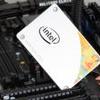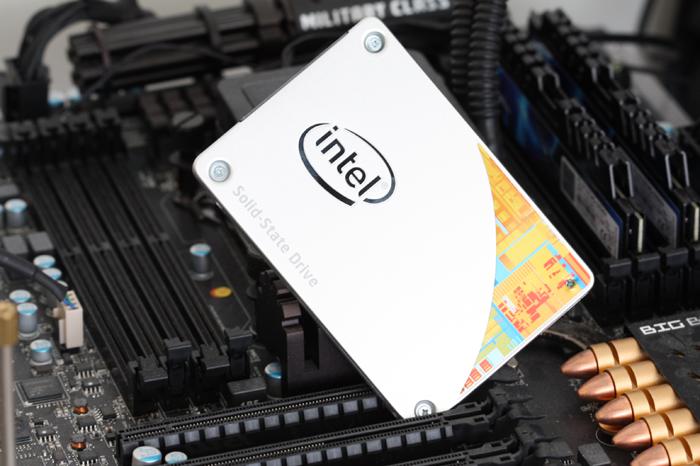Final words and conclusion
Final words and conclusion
We really liked the 520 series, and the 530 series really isn't at all that different for the end-user. Overall Intel transitioned to 20nm NAND flash memory and that's pretty much it. It's more cost effective and while they were at it, the lowered the power consumption to a great degree making the 530 series excellent for mobile storage in Laptops, Ultrabooks and so on.
Now the 520 series have been quite a success, the 530 simple will continue on that legacy. These SSDs have been proven to be reliable and perform very decent, with hardly any firmware updates it's been one of the more reliable product backed by Intel. And considering trust is an issue these days with some brands; that just tells us a lot, hence we think the 530 series can become popular if priced right. The LSI SandForce controllers are stable these days, and it shouldn't be a reason to "not" get one. But storage is all about reliability, and if a reputation is dented... well it might be until the next generation until people will regain that trust. That's why we are a littler surprised to see a SF based controller being used once again in the 530. Data integrity means the world to us, you can't forfeit on that -- period. Talking about integrity, the driver will last you roughly 10 years if you write 10 GB per day on it.
Performance
If you put a drive like this into your SATA 3 compatible laptop or SATA 3 compatible PC, you'll have no idea what is about to hit you. We very much enjoy the grand sustained performance of this SSD series, so you copy a fast amount of compressed data, then the Series 530 will slay and slaughter in performance. Overall this SSD shines at many factors and in many levels, IOPS performance is very good. This SSD is writing and reading serious amounts of tiny files in a very fast fashion (until the buffer is full). We stated it before though, IOPS is not something you as a consumer should worry about too much unless you are doing a lot of database related or create similar workloads on your PC, but this SSD certainly is ranking high within this aspect. Trace testing we think is by far the best test in our entire benchmark suite is PCMark Vantage 64-bit. This is a trace test and can emulate what you guys do on your PC but then multiplied with factor 100. Sustained read write performance, again excellent. Especially read performance leads and is top ranking.
Overall SSD usage
An SSD is enjoyable, very much so. If you put a drive like this into your SATA 3 compatible laptop or SATA 3 compatible PC, you'll have no idea what is about to hit you. As stated we very much enjoy the grand overall performance of this SSD series, so when you copy a fast amount of compressed data, then the SSD will perform seriously fast in performance. Make no mistake, replacing a HDD with an SSD in your desktop PC or laptop eliminates the random access lag of the HDD head, it is no longer mechanical. That combined with the performance SATA3 offers these days is simply a massive difference and probably the best upgrade you can make for your computer anno 2012.
SATA Controllers
Some overall recommendations then. Should you be in the market for a SATA 3 SSD then we have a couple of hints. First and foremost if you have a SATA2 controller only on your motherboard, then you'll get limited at roughly 270 MB/sec read and writes. SATA3 (6Gbps) will free you up from that allowing the SSD to perform in the 500 MB/sec range. It however is important that you connect your SSD towards the proper controller. We absolutely prefer the performance of the Intel Series 6 and 7 (H67/P67/Z68/Z77/H77/X79/Z87) integrated SATA 6G controller over anything else available in the market. If you run the SSD from a 3rd party controller with say a Marvell 6G controller, you will see lower performance. The new AMD 85X chipsets also offer fantastic performance. The more recent Asmedia controllers we spotted lately on motherboards are also offering good performance, albeit still 20%~25% slower then Intel's controllers. Also make sure you run your drive in AHCI mode, it does make such a difference in performance -- really guys, a big difference.
Prices HDD versus SSD
First a generic rule that I always apply; you should probably stop looking at the Solid State Disk technology as if it were a traditional HDD. We all will be old and grey before the two reach the same prices or top the multiple TB volume storage the HDD offers for less money. Comparing an SSD with an HDD is making a comparison in-between an integrated IGP or a dedicated graphics card, that last one will cost you a heck of a lot more yet you gain incredible overall performance. It is the very same with an SSD, use it as boot drive on Windows and applications and you instantly have removed a huge bottleneck, namely load and access times. It is a difference in-between night and day (in a proper system). For massive storage like movies, MP3 files and bulky data you do not access on a regular basis, sure that's where the HDD remains the winner as a cheaper storage solution. Guru3D's rule of thumb; the magic simply is finding a good combination in-between the two and balance things out. Use a nice 240GB SSD for your operating system and applications, and park these movies and MP3 files onto a separate TB HDD. That's where the magic happens. I kid you not, all my test systems and work systems run on SSDs, not once have I considered going back to HDDs. The benefits of a good SSD are simply grand. But that doesn't mean I do not understand the budget and cost dilemma that many of you are facing though.
Pricing
As mentioned on page two of this review, we looked up the numbers from some online etailers. Currently only two drives are available for purchase in the USA and EU:
- 180GB costs 199 USD / 170 EUR
- 240GB costs 259 USD / 220 EUR
Concluding
Choice is good. The Intel series 530 SSD positions itself in a massively saturated market. The model as tested today is a nice performing product, not a top performing one though. The overall read performance is good, the trace tests a little average though. But the sustained reads and writes are exceptional. If IOPS matter to you for say database utilization then again this is a segment where the SSD is very strong as well with a rated 80K IOPS on writes. At a price of sub 220 EUR for a 240 GB model we'll have to see how popular the 530 series really will become. Intel will cover this product with a five year warranty, opposed to the two or three years you see from other manufacturers. We can certainly recommend the 530 series, it is lovely in terms of storage performance and as such comes recommended.
- Sign up to receive a notice when we publish a new article
- Or go back to Guru3D's front page



